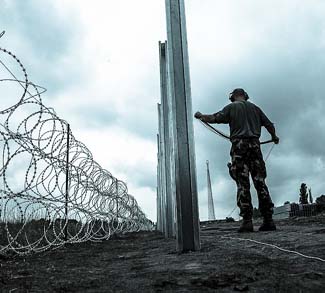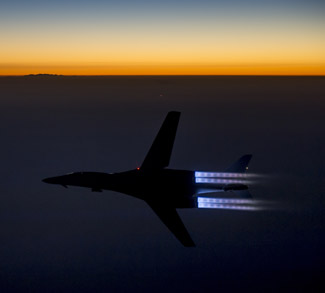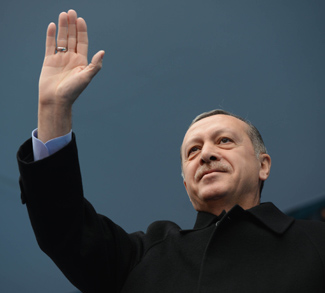Refugees are not the problem; war is. If the war in Syria doesn’t stop, the flow of refugees will only continue. The refugee wave, marked by the dramatic image of tens of thousands of Syrians trying to reach Germany from Hungary, is a phenomenon that until very recently has been confused, perhaps deliberately, with mass migration. There is an important difference: migrations are frequently driven by financial or social exclusion. What is happening now in Europe is the inevitable consequence of unresolved crises in Syria, Iraq, Libya, Yemen, and Afghanistan – all related to the collapse of these countries’ respective states, the result of wars for which the West bears much responsibility.
Many of the Syrian refugees are ethnic Kurds. Most are escaping from Ayn al-Arab, located near the Syria-Turkey border. Kobane is another popular source. Both have been under attack or siege by Islamic State as the group tries to secure a ‘corridor’ between the area it controls and Turkish territory, which provides a source of fresh recruits and an outlet for oil extracted from Syrian fields. Recently, Turkey has changed its refugee strategy, now preferring to turn them away. Turkey has even blocked Iraqi Kurdish Peshmerga fighters who want to assist Kobane’s residents in defending the city, implying a de-facto, if not de-jure, collusion between Ankara and the Islamic State. Meanwhile, the majority of refugees stranded in Hungary are Syrians and while the Islamic State’s brutality has forced them to seek refuge in Europe, Western governments’ insistence on refusing to deal with the Syrian government of President Bashar al-Assad, instead demanding its collapse, has prolonged the Syrian civil war.
Just as the European Union confronts the Syrian influx and the related problem of quotas for its member states, many of which have already absorbed tens of thousands of refugees from other wars and troubled regions, it seems to be ignoring the root causes of their suffering. Bluntly, the cause is a Middle East in disarray, a state for which the West has its own share of responsibility (Afghanistan, Iraq, Syria), contributing to the rise of groups fighting proxy battles for regional players such as Turkey, Qatar, Saudi Arabia, and the Emirates. The latter have sponsored rebels in various guises with weapons and money rather than encouraging peace building and some kind of a negotiated peace in Syria, one that includes rather than excludes the current government. The images of Aylan, the little boy who was found dead on a Turkish beach, seem to have suddenly woken up the world, as if tens of thousands of children had not already died in Syria during these four and a half years of war. And what to make of the many deaths in Iraq since 2003? Meanwhile, the Middle East threatens to explode, producing refugees not in the hundreds of thousands but in the tens of millions, threatening Europe’s own survival – and the world’s.
A colder and more analytical approach to the Syrian refugee crisis reveals that the Balkan route, leading to its Hungarian critical point, is no more than a year old. Like the African route that has Libya as its final destination before the sea trek toward Malta and Italy, the Balkan route has become well frequented over a relatively short period. The war in Syria broke out in 2011 and turned almost immediately into a proxy war between states in the region. The West has encouraged the influx of foreign fighters from the Turkish border, in apparent agreement with its Sunni allies – Turkey, Saudi Arabia, and Qatar – to overthrow the Assad government, only to later be reminded of the folly of this policy by the rise of Islamic State. The deliberate destabilization of the Assad regime has produced a boomerang effect, creating radicals and refugees – and it does not take many radicals, posing as refugees, to cross borders and bring a little taste of that destabilization to Europe. The West has learned little from the experience with the Mujahedeen, which the United States armed and organized to fight the Red Army in Afghanistan. The rise of Islamic State has generated over 200,000 refugees, including Christians and Yazidis, in northern Iraq alone. Now there are two million Syrian refugees in Turkey, and one million in Lebanon – which was already dealing with its own delicate political and ethnic balance. A million Syrians have crossed the border into Jordan – not a country with many resources – adding considerable political pressure on the Kingdom. Europe has started to absorb more refugees as Turkey’s initial generous hospitality proved a strategic move to facilitate the elimination of Assad and his allies. Yet, Assad and the Alawi dominated Ba’ath Party are still there and thanks to the Iran nuclear deal, the regime’s demise looks rather unlikely. Turkey’s primary interest now is less stopping the Caliphate and more slowing the rising Kurdish tide just outside borders, which threatens to incite Kurdish nationalism within them.
Indeed, Ankara’s policy on Islamic State has been ambiguous at best. It was reluctant to challenge the self-proclaimed jihadists from Islamic State, facilitating its growth by encouraging – or willfully ignoring – the entry of fighters into Syria and Iraq through its borders. This has certainly allowed the war to continue and flourish. Moreover, President Erdogan and the AKP Party, which has already suffered a blow losing its parliamentary majority, face an uncertain political future as Turks prepare to vote again this fall with the Kurdish parties expected to win even more votes than last spring’s election. Therefore, Turkey has many problems at home and does not intend to confront Islamic State in the interests of stopping the war in Syria, except where it can defeat its real enemy, which is the Kurdish PKK, the paramilitary organization which aspires to an independent state of Kurdistan.
The sudden flow of refugees to Europe could be considered as Turkey’s retribution for having been ‘persuaded’ to accommodate US drones and fighter jets at its Incirlik air base – even if Turkey is an important NATO member. Up until this past year, Turkey had managed to keep its borders sealed to prevent the very wave of migration to Europe which has allowed the refugee crisis to reach its current point point. Because Turkey no longer needs the Syrians, they have been allowed to proceed to Greece. New refugees from Syria are avoiding the Turkish borders altogether, preferring to make the short crossing to the Greek island of Kos, in what has been a very recent phenomenon. This has perhaps started to persuade some in the Obama administration – Obama himself may have reached this conclusion earlier – that Syria cannot be stabilized, which means breaking the jihadist tide – without the support of the very regime which has ruled the country for decades. Among evaluation errors, ambiguities, contradictions, and sudden policy changes, European leaders must now explain an emergency in which migrants are the last link in a chain of high-profile geopolitical mistakes made since the very start of the Syrian revolt in March 2011.
The opinions, beliefs, and viewpoints expressed by the authors are theirs alone and don’t reflect any official position of Geopoliticalmonitor.com.




